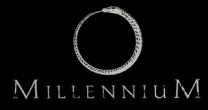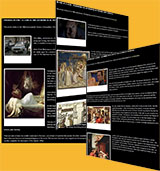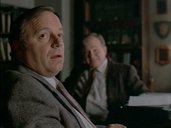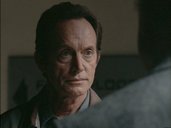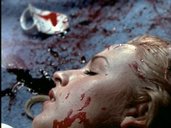Chris Carter introduces us to Millennium
Chris Carter 1996 Video Interview Transcript
The following transcript was composed from a 1996 interview with Chris Carter which was provided on the first ever UK VHS video release of Millennium; specifically from Volume 1 - Pilot / Gehenna. You can download the actual video here along with several others recorded by some of Millennium's cast members.
This video tape is often available on Ebay as a Collector‘s item, in both PAL and NTSC video formats.
Chris Carter - Creator, Producer, Writer and Director of Millennium
After the success of The X-Files, it was about the middle of season two when FOX came to me and asked me if I would do another series and I’d told them subsequent to this that I’d had an idea rattling around in my head to do a show about the approaching millennium. It really is an exploration of evil on the show, the now scientific approach to the explanation of evil which is a psychological one, which says everyone is a victim of something. I was interested in the unscientific approach. The Bible plays an important role in the show, it‘s not a show about the Bible yet you'll find a lot of these stories are in there and have been told before, it gives the show a nice foundation, it attempts to explain things on various levels not just in the modern scientific way.
PILOT
In the pilot episode we set up the visual and seed of the show, we get into Frank‘s head for snippets of disparate and disconnected images. People get confused about Frank Black‘s gift, his ability, his facility, which is to get into the heads of violent criminals, to get into the heads of murderers or serial killers, to think like they think, and they confuse it with him being psychic or clairvoyant. I really see it as a perfection of technique as art.
People have said to me that they think Millennium is the darkest show on television, I really don‘t think that it is, I defend that regularly because I think that it actually has a very, very bright center, a very bright hero. I think his dark is the world he lives in, works in, he is a person who has a tremendous amount of optimism and hope and I think if you look at what this man does, what his motivations are, they're very bright and noble and very interesting to me in that way. A yellow house to me represents happiness and I wanted that to be a very happy house, a sanctuary, a place where Frank could keep his family safe. He was literally, by painting the house yellow, painting away the darkness which I think is really what Frank‘s goal is, is to keep his family in the light away from the darkness.
I had tried to cast Lance Henriksen on The X-Files several times, he had always been either unavailable or uninterested. Anyway I remained a fan of his, I was in bed working in Vancouver and I realized he was working there too. So I found out where he was staying, wrote a note and had a fan note slipped under his door and told him that I’d tried to get him on the show and hoped to work with him in the future. Little did he know when I was then writing Millennium I was writing with only him in mind, with no idea whether or not he’d actually do the project. So I wrote the project, approached him, he was very excited about it, we made a deal and the rest is now history.
As on The X-Files with Mulder and Scully, Mulder being my mother‘s maiden name, Scully being the name of Vin Scully, Millennium has the lead character Frank Black. Black actually should have been my name, the family name changed from Black to Carter in some mysterious episode in my history that I still don‘t know much about. So my name should actually be Chris Black. Catherine is my mother‘s name, so Catherine Black gets her name from my mother, so there are little nods to my own family history on Millennium as there are on The X-Files.
The image that appears on the main title of the show which is a snake eating its tail, a circular snake, the snake is a classic and ancient image. I think it‘s come from several different cultures. It‘s called the "Ouroboros" and it has many different meanings. One is eternal return, everything being circular, everything recurring and also of a snake eating its tail, of it devouring itself which is a more negative context. I thought for Millennium it had equal parts of each and left some then to the imagination of what it might mean. But it‘s a very powerful image and I think it‘s really perfectly representative of the show.
GEHENNA
The title of the episode, the second Millennium episode, which is a very important episode to the series, is "Gehenna" which is the Hebrew word for Hell. That was an interesting word that had some type of strange, mysterious, historical significance.
I came up with this idea to have these boys, these tele-marketers who were driven by greed, to have them motivated by these words that flash up on this screen. There were many different sins expressed up on that screen. The idea that evil could be carried out over the telephone is also a very scary idea and one that I think is all too real and common these days. People can reach right into your homes in so many ways now, by fax, over the telephone, through your computer and I think this is one of the ways that we're scared these days. This is something I was trying to communicate.
The approach of this date, the year 2000, is very significant whether you believe in it or not because there is a certain nervousness about the future, about change, about what might lay beyond that date. It‘s a significant date because people believe it‘s significant, we don‘t know what lies on the other side of that date and I'm playing with that as a storyteller.
Transcribed from the UK video release of Millennium episodes Pilot and Gehenna

